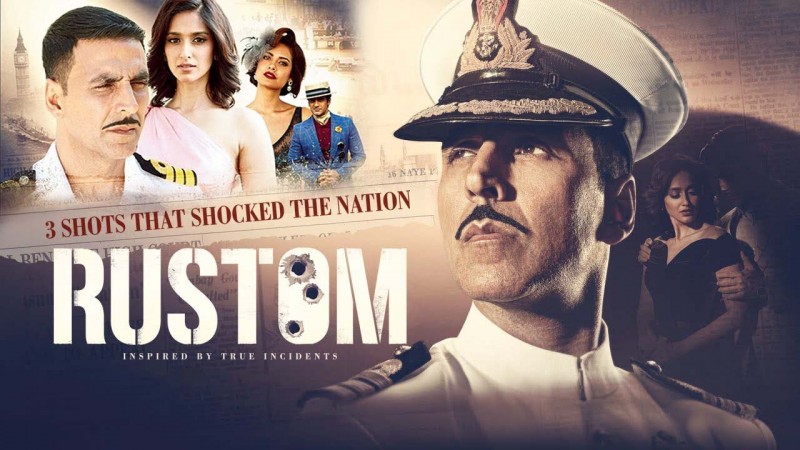
The Nanavati murder case is one of the few cases in India's legal history to have so thoroughly captured the nation's attention. During the course of this sensational trial, which took place in the late 1950s, there were themes of justice, honor, betrayal, and love. The trial ended with a verdict that forever changed the legal climate of the nation. The case still fascinates and motivates people decades later, so much so that it served as the inspiration for the 2016 Bollywood film "Rustom." The film's tagline read, "Three shots that shook the nation." The question is, did those three shots really rock the country, and how did they earn their place in movie history? We must delve into the compelling tale of the Nanavati murder case in order to provide answers to these questions.
In the early 1950s, the story is set in Bombay (currently Mumbai). An attractive and charismatic woman named Sylvia was married to the dashing Indian Navy officer Naval Commander Kawas Manekshaw Nanavati. The couple seemed to have it all: a close-knit family, respect in society, and a lavish lifestyle. However, trouble was brewing behind this front.
Commander Nanavati frequently embarks on lengthy voyages, leaving Sylvia in Bombay by herself. Prem Ahuja was a wealthy and likable businessman who Sylvia met while he was away. What began as a simple friendship quickly turned into an intense love affair.
Through a series of letters exchanged between Sylvia and Ahuja in April 1959, Commander Nanavati learned of his wife's adultery. He confronted Sylvia because of his intense jealousy and wounded pride, and she admitted to having an affair with Ahuja. The events that followed made national headlines.
Prem Ahuja was confronted at his home by Commander Nanavati on the morning of April 27, 1959. He insisted that Ahuja wed Sylvia in order to restore her honor. Ahuja declined even though he had previously made a commitment to marry Sylvia but later broke his word. Commander Nanavati stormed out of Ahuja's home in a rage and distress, pledging to resolve the situation on his own.
Nanavati made his way straight to the naval base, where he procured a revolver with the intention of shooting himself. He went to Ahuja's office, though, and confronted the man once more. This time, the argument became physical. Ahuja was shot three times by Nanavati, who then killed him. He went to the police as soon as the shooting was over and admitted to the crime.
The Nanavati case quickly gained notoriety due to the prominent people involved as well as the morality, honor, and betrayal themes it covered. Journalists from all over the nation covered the trial at the Bombay Sessions Court, which was a media circus. Because Commander Nanavati was a Parsi and Prem Ahuja was a Sindhi, it also caused linguistic and racial divisions in the country.
The defense maintained that Nanavati committed a crime of passion, while the prosecution claimed that her actions constituted premeditated murder. In an unexpected turn of events, the jury returned an 8-1 verdict finding Nanavati not guilty. There were conflicting responses to this choice; some hailed it as a victory for honor, while others denounced it as an injustice.
The Nanavati case had broad ramifications. Due to the perception that the jury's decision had been influenced by public opinion and media coverage, jury trials for serious offenses were abolished in India as a result. The case also demonstrated the intricate interactions in India between societal norms, legal principles, and human emotions.
"Three shots that shook the nation," reads the tagline on the movie "Rustom"'s poster. The three shots fired by Commander Nanavati that forever changed both his life and the country's legal history are directly referenced in this tagline. The significance of these three shots was due to what, though?
The first shot is a representation of the crime's motivations of passion and betrayal. Upon learning of his wife's adultery, Commander Nanavati's entire world fell apart. Ahuja's pain and rage reached their zenith with the first shot that was fired inside his office.
Legal Drama: The second image depicts how the trial's legal drama played out. Society's expectations and legal principles clashed on display in the courtroom. The fate of Commander Nanavati was in the spotlight as the country watched in rapt attention.
Impact on Society: The third bullet stands for the case's enduring social effects. It sparked a review of India's legal framework and resulted in substantial modifications to how trials were conducted. The case served as a focal point for debates on justice, honor, and the function of the media in shaping public opinion.
The Nanavati case left a lasting legacy that served as a cultural touchstone in addition to having an impact on India's legal system. Numerous books, documentaries, and movies were inspired by the case, including the aforementioned "Rustom." Akshay Kumar played Commander Nanavati in this movie, introducing a whole new audience to the compelling story.
As the real-life Nanavati did in 1959, "Rustom" explores the complex emotions and ethical dilemmas that its protagonist encounters. The movie challenges viewers to consider where true justice really lies by attempting to humanize the characters and explore their motivations.
The slogan "Three shots that shook the nation," which appears on the poster for the movie "Rustom," perfectly sums up the Nanavati murder case. The nation was shaken by the three shots fired by Commander Nanavati in the heat of passion and betrayal in 1959 and the years that followed. A review of jury trials and their susceptibility to outside influences was prompted by the case, which acted as a catalyst for change in India's legal system. Furthermore, it continues to be a topic of interest and discussion, serving as a reminder that the search for justice is frequently as difficult and elusive as the human emotions that motivate it.
Shah Rukh Khan's Brush with 'Baghban' as Alok Raj
'Baghban', A Cinematic Masterpiece Born from a Danish Encounter